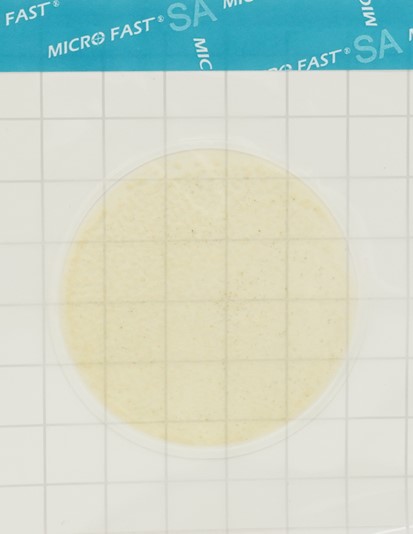- Antibiotics Tests in Milk
- Inhibitory detection test
- Laboratory equipment
- Centrifuges
- Indicator strips
- Autoclaves
- Scales
- Thermometers
- Packing
- PureTrust ATP monitoring
- ATP monitoring PIONEERPRODUKT CleanTrust
- MICROFAST® substrates
- Nutrient media
- Ice cream sticks
- Consumables
- Detergents and disinfectants
- Treatment agent
- Milk filters
- Wipes
- Gloves
- Sampling
Scientists have linked the death of 17 thousand COVID patients to a malaria drug
About 16.9 thousand people in six countries - France, Belgium, Italy, Spain, Turkey and the United States - could have died from taking the antimalarial drug hydroxychloroquine during the first wave of the CORONAVIRUS pandemic . French researchers came to this conclusion; the results of their study were published in the journal Biomedicine & Pharmacotherapy.
Hydroxychloroquine was prescribed “despite the lack of evidence to support its clinical benefit,” the scientists pointed out. They relied on estimates published in 2021 in the journal Nature that found the use of hydroxychloroquine increased deaths by 11% due to heart rhythm disturbances and other side effects. The death toll may be significantly higher because the study only covers the period from March to July 2020, when hydroxychloroquine was prescribed most frequently.
In addition to treating malaria, hydroxychloroquine is also prescribed for rheumatoid arthritis, lupus and some other autoimmune diseases
The WHO stopped trials of hydroxychloroquine as a treatment for COVID in June 2020 after heart problems were discovered in some patients. At the same time, the US regulator revoked the emergency use authorization of hydroxychloroquine and chloroquine, a related anti-malarial drug, after experts found they could have dangerous side effects.
The Russian Ministry of Health then did not exclude hydroxychloroquine from recommendations for the treatment of COVID, reporting effective use in small doses in patients with mild and moderate forms of COVID. At the same time, the department admitted that the mechanism of action of hydroxychloroquine has not been fully studied. The Ministry of Health recommended stopping hydroxychloroquine only in May 2021.
Donald Trump , who served as US President at the beginning of the coronavirus pandemic, talked about taking hydroxychloroquine daily as a preventive measure against COVID. “What do you have to lose? Take [this medicine],” Trump advised.
 Rapid tests PIONER 5 in 1 for the determination of sulfonamides, tylosin, tilmicosin, lincomycin, erythromycin, fluoroquinolones
Rapid tests PIONER 5 in 1 for the determination of sulfonamides, tylosin, tilmicosin, lincomycin, erythromycin, fluoroquinolones PIONEER MEIZHENG BIO-TECH (5 in1) JC0586 - Antibiotic tests 5 in 1 / Rapid tests for determining the residual amount of β-lactams, tetracyclines and cephalexin in milk, whey
PIONEER MEIZHENG BIO-TECH (5 in1) JC0586 - Antibiotic tests 5 in 1 / Rapid tests for determining the residual amount of β-lactams, tetracyclines and cephalexin in milk, whey PIONEER MEIZHENG BIO-TECH (5 in1) JC1165 / Rapid tests for the determination of the residual amount of halofuginone, flavomycin, novobiocin, flunixin, dexamethasone / prednisolone in milk, whey
PIONEER MEIZHENG BIO-TECH (5 in1) JC1165 / Rapid tests for the determination of the residual amount of halofuginone, flavomycin, novobiocin, flunixin, dexamethasone / prednisolone in milk, whey PIONEER MEIZHENG BIO-TECH (5 in 1) JC0726 / Rapid tests for determining the residual amount of Bacitracin, ansamycins, clindamycin, spiramycin, florfenicol in milk, whey
PIONEER MEIZHENG BIO-TECH (5 in 1) JC0726 / Rapid tests for determining the residual amount of Bacitracin, ansamycins, clindamycin, spiramycin, florfenicol in milk, whey Rapid tests for determining the residual amount of chloramphenicol in meat
Rapid tests for determining the residual amount of chloramphenicol in meat Express tests for determining the residual amount of β-lactams and tetracyclines in milk, whey
Express tests for determining the residual amount of β-lactams and tetracyclines in milk, whey- PIONEER MEIZHENG BIO-TECH (5 in1) JC0871/ Rapid tests for the determination of the residual amount of β-lactams, tetracyclines, chloramphenicol, streptomycins, ceftiofur in milk, whey.
- Express tests for determining the residual amount of β-lactams, tetracyclines, chloramphenicol, streptomycins in milk, whey
- Rapid tests for fluoroquinolone, erythromycin, lincomycin, tillosin and tilmycosin residues in milk, whey
- ANTIBIOTICS / ELISA TESTS
 Bactericidal irradiators - recirculators (working in the presence of people) Defender
Bactericidal irradiators - recirculators (working in the presence of people) Defender MB90/MB120 moisture analyzer (Ohaus)
MB90/MB120 moisture analyzer (Ohaus) General laboratory cabinets
General laboratory cabinets Milk quality analyzer "Laktan 1-4M" isp. 220
Milk quality analyzer "Laktan 1-4M" isp. 220 Timer with winding for 20 hours electronic Aptaca
Timer with winding for 20 hours electronic Aptaca Metal closets
Metal closets- Laboratory heating plate PL-01
- Closet
- Laboratory thermostat-reducer "LTR-24"
- OHAUS Pioneer (PR) precision scales 0.001g, (220g, 420g, 520g)
- Laboratory heating plate PRN-6050-2
- Milk analyzer Expert Super Breeding
- Thermohygrometer Testo 625
- EV series heaters
- HI 8424 portable pH/ORP meter/thermometer (pH/ORP/T)
 Plastic packaging for cakes and pastries
Plastic packaging for cakes and pastries Laminating paper KH PACK®
Laminating paper KH PACK® GableTop aseptic packaging
GableTop aseptic packaging Grease and barrier paper KH PACK®
Grease and barrier paper KH PACK® Cartons for milk and dairy products
Cartons for milk and dairy products Paper for micro-ribbed
Paper for micro-ribbed- KH PACK® tartlet paper
- Korreks for confectionery
- Siliconized paper for hygiene products
- KH PACK® Straight Packing Paper
- Korreks for desserts
- Parchment
- KH PACK® bag making paper
- Cover
- Skiving and Hemming Technology
 Pepsin whey pork
Pepsin whey pork Auxiliaries for sugar products
Auxiliaries for sugar products Petri dish 90 mm
Petri dish 90 mm Wafer cup and cone
Wafer cup and cone Ice cream sticks Standard 114
Ice cream sticks Standard 114 J-Bottom technology
J-Bottom technology- General purpose environment of SPC "Biocompass-S" (Uglich)
- Ice cream sticks Magnum (curly)
- Ice cream sticks (round)
- Ice cream sticks Standard 93
- Ice cream sticks (with logo)
 Plastic bracelet
Plastic bracelet Pump for artificial ventilation of the lungs
Pump for artificial ventilation of the lungs Acid detergent (20l / 24kg)
Acid detergent (20l / 24kg) Disinfectant with washing effect (10kg)
Disinfectant with washing effect (10kg) Forged pitchforks
Forged pitchforks Drencher for feeding calves with a rigid probe
Drencher for feeding calves with a rigid probe- Udder cleaner after milking (20 l)
- Rubber rings for castration
- Reusable plastic syringe
- Veterinary glove to the shoulder and through the neck
- Mug for milking the first streams of milk.
- Mug for milking the first streams of milk, lengthwise
- Milk bottle
- Spatula for mastitis test (Shalm's test)
- Stainless steel obstetric aid
 Substrate for determining the number of staphylococci (Catalog number LR1005) MicroFast® Staphyloccocus aureus Count Plate
Substrate for determining the number of staphylococci (Catalog number LR1005) MicroFast® Staphyloccocus aureus Count Plate MicroFast® Bacillus cereus Count Plate (catalog number LR1010)
MicroFast® Bacillus cereus Count Plate (catalog number LR1010) MicroFast® Coliform & E.coli Count Plate
MicroFast® Coliform & E.coli Count Plate Yeast & Mold Count Plate (cat. no. LR1003) MicroFast® Yeast & Mold Count Plate
Yeast & Mold Count Plate (cat. no. LR1003) MicroFast® Yeast & Mold Count Plate MicroFast® Enterobacteriaceae Count Plate (cat. no. LR1011)
MicroFast® Enterobacteriaceae Count Plate (cat. no. LR1011) MicroFast® Lactic Acid Bacteria Count Plate (Part Number LR1312)
MicroFast® Lactic Acid Bacteria Count Plate (Part Number LR1312)- MicroFast® Staphyloccocus aureus Confirmation Plate Staph.aureus Confirmation Plate (cat. no. LR1005Q)
- MicroFast® Microbiological Substrates
- MicroFast® Environmental Listeria Count Plate
- Substrate for determining QMAFAnM (catalog number LR1001)
- Substrate for accelerated determination of QMAFAnM, (catalog number LR1321)
- Coliform Count Plate (catalog number LR1002) MicroFast® Coliform Count Plate
- MicroFast® Salmonella Count Plate (SAL), for the determination of Salmonella in food and environmental samples (Catalog #LR1006)
 Первые в центральном регионе. Узнали, какой каравай зерновых собрали в этом сезоне в ОАО "Гастелловское" 03.10.2025
Первые в центральном регионе. Узнали, какой каравай зерновых собрали в этом сезоне в ОАО "Гастелловское" 03.10.2025 Калининградская область заинтересована в обмене опытом с Беларусью в мелиорации и закупке техники01.10.2025
Калининградская область заинтересована в обмене опытом с Беларусью в мелиорации и закупке техники01.10.2025 Belarusian exports of dry milk products to Myanmar quadrupled in the first half of the year. 01.10.2025
Belarusian exports of dry milk products to Myanmar quadrupled in the first half of the year. 01.10.2025- В ОАО "Агро-Колядичи" умеют получать завидные урожаи30.09.2025
- "Россь" не рассчитывает на авось30.09.2025
- Куда инвестирует бизнес? Узнали, какой город в Беларуси выбрал для вложений производитель протеиновых батончиков30.09.2025
- БУТБ обеспечит платформу для взаимодействия белорусского и индонезийского бизнеса28.09.2025
- В ОАО "Святая Воля" в Ивацевичском районе за полгода выручка на каждого работника составила Br98 тыс.27.09.2025
- Газ на пятилетку, вторая АЭС, защита общего рынка и Украина. Подробности переговоров Лукашенко и Путина27.09.2025
- Record-breaking animals are being raised at the Ross breeding farm in the Volkovysk district.26.09.2025
- Шашлычок, мясные шарики, гуляш, борщ. Посмотрели, чем кормят детей в школе и сколько это стоит26.09.2025
- At OJSC "Svyataya Volya" in the Ivatsevichi district, revenue per employee over the past six months amounted to Br98 thousand.26.09.2025
- OAO Ostromechevo invested over $18 million in livestock development.26.09.2025
- Farmers at Rogoznyansky JSC in Zhabinka District increased their grain yields by more than a third.25.09.2025
- В ОАО "Агро-Колядичи" самой урожайной культурой оказался ячмень25.09.2025
- Алтайский край заинтересован в развитии биржевой торговли с Беларусью25.09.2025
 В Алтайском крае наблюдается уменьшение поголовья скота при росте молочного производства03.10.2025
В Алтайском крае наблюдается уменьшение поголовья скота при росте молочного производства03.10.2025 Красноярский край выделяет 60 миллионов рублей на поддержку аграриев для покупки племенных животных03.10.2025
Красноярский край выделяет 60 миллионов рублей на поддержку аграриев для покупки племенных животных03.10.2025 Чили — второй по величине рынок бразильской свинины03.10.2025
Чили — второй по величине рынок бразильской свинины03.10.2025- Испания остаётся ведущим производителем комбикормов в Европе03.10.2025
- В сентябре Россельхознадзор проконтролировал 82 тысячи тонн продукции животноводства в Московском регионе03.10.2025
- Рост сельхозпроизводства в августе: увеличение на 6,1% по сравнению с июлем03.10.2025
- Новый федеральный проект по поддержке малого агробизнеса: инвестиции и развитие сельских территорий03.10.2025
- Снижение объемов реализации сельхозпродукции в России за 2025 год: изменения и тенденции03.10.2025
- ПРОДО Омский Бекон запускает новый участок опороса с высокой производительностью03.10.2025
- Ростовская область экспортировала в Грузию новую партию свиней на убой03.10.2025
- Революция в производстве мяса птицы: Семикаракорский комбинат увеличил объемы на 25%03.10.2025
- Производитель тушенки в Бурятии повторно оштрафован за нарушения03.10.2025
- Miratorg's 15th Anniversary: The Meat Retail Leader Celebrates Its Anniversary03.10.2025
- Тюменская сеть магазинов «Светофор» оштрафована на 700 тысяч рублей за продажу мяса с антибиотиками02.10.2025
- В продукции ООО «Мерилен» в Хабаровске обнаружены кишечные палочки и превышение норм02.10.2025
- В Калужской области разоблачены торговцы фальсификатом мяса и рыбы02.10.2025
 10 reasons to take a deposit04.05.2025
10 reasons to take a deposit04.05.2025 Губернатор назвал меры по борьбе с топливным кризисом в Хабаровском крае02.10.2025
Губернатор назвал меры по борьбе с топливным кризисом в Хабаровском крае02.10.2025 Bloomberg узнал о плане G7 значительно ужесточить санкции против России02.10.2025
Bloomberg узнал о плане G7 значительно ужесточить санкции против России02.10.2025- G7 заявила о проработке использования всей суммы российских активов02.10.2025
- Фон дер Ляйен заявила о смене подхода к санкциям против России02.10.2025
- США раскрыли долю поставляемого из России топлива для ядерных реакторов01.10.2025
- Евросоюз частично восстановит санкции против Ирана30.09.2025
- Yle узнал, что ЕС не планирует вносить российский никель в список санкций28.09.2025
- Иран сообщил о предложенной Штатами отсрочке санкций в обмен на уран28.09.2025
- Кремль отреагировал на планы ЕК изменить механизм продления санкций27.09.2025
- МИД ввел санкции против Британии и назвал ее меры «тришкиным кафтаном»27.09.2025
- Politico has learned that the European Commission has proposed changing the sanctions extension mechanism.26.09.2025
- В Венгрии подсчитали убытки из-за отказа от российского газа26.09.2025
- The FT reported on the German cellist's "too bold" ties to Russia.26.09.2025
- Bloomberg назвал условие Индии для отказа от российской нефти26.09.2025
- EUObserver узнал о нежелании ЕС закрываться от российских туристов25.09.2025
 В Британии предупредили о риске для миллионов из-за супербактерий06.01.2025
В Британии предупредили о риске для миллионов из-за супербактерий06.01.2025 Moscow court sides with Indian company in dispute with Health Ministry26.11.2024
Moscow court sides with Indian company in dispute with Health Ministry26.11.2024 Scientists estimate increase in mortality due to drug-resistant bacteria29.10.2024
Scientists estimate increase in mortality due to drug-resistant bacteria29.10.2024- Antibiotics for livestock and pesticides found in poisoned family's home29.10.2024
- Izvestia reported on the shortage of widely used antibiotics in Russia29.10.2024
- The Ministry of Health called data on the shortage of antibiotics unreliable29.10.2024
- Scientists warn of threat of return to pre-penicillin times29.10.2024
- The Ministry of Health explained how attitudes towards antibiotics changed during the pandemic07.05.2024
- WHO explains the risks of taking antibiotics "just in case"06.05.2024
- Doctors warn of bad practices after government decision on antibiotics25.04.2024
- The Ministry of Health removed antibiotics and hormones from the standard treatment of ARVI25.04.2024
- Antibiotics in oil: myth or reality?06.03.2024
- Antibiotics in sour cream: myth or reality?05.03.2024
- Antibiotics in goat milk: effects, problems and control measures16.02.2024
- The Japanese will stop producing the popular antibiotic vilprafen in Russia23.12.2023
- Antibiotics in Milk21.12.2023
 Antibiotics in pollock25.02.2024
Antibiotics in pollock25.02.2024 Antibiotics in herring: myth or reality?12.02.2024
Antibiotics in herring: myth or reality?12.02.2024 Antibiotics in perch10.02.2024
Antibiotics in perch10.02.2024- Antibiotics in sprat: facts and myths10.02.2024
- Antibiotics in tuna: an important health and environmental issue09.02.2024
- Antibiotics in meat30.01.2024
- Antibiotics in chebureks: myth or reality?29.01.2024
- Antibiotics in cutlets: problem or myth?18.01.2024
- Antibiotics in Chicken: Where Are the Highest Concentrations?17.01.2024
- Antibiotics in carp17.01.2024
- Where Are More Antibiotics in Chicken: Reality and Cautions16.01.2024
- Antibiotics in Salmon: Safety and Product Quality16.01.2024
- Antibiotics in Turkey15.01.2024
- Antibiotics in Sal: Reality and Safety Issues15.01.2024
- Antibiotics in Fried Dumplings: Facts, Risks and How to Stay Safe15.01.2024
- Antibiotics in sausages14.01.2024
 Antibiotics in Coffee: Myths and Reality03.05.2025
Antibiotics in Coffee: Myths and Reality03.05.2025 Forged forks: 10 interesting facts16.05.2024
Forged forks: 10 interesting facts16.05.2024 Swimming pool and weight loss: 10 interesting facts10.03.2024
Swimming pool and weight loss: 10 interesting facts10.03.2024- Tests for antibiotics in milk - 10 interesting facts07.03.2024
- Cleaning the kettle from scale, 10 interesting facts...06.03.2024
- Antibiotics in beer: 10 interesting facts04.03.2024
- Wild boar, how to survive...01.03.2024
- Purulent mastitis, 10 interesting facts27.02.2024
- Lemon and alcohol: 10 interesting facts25.02.2024
- Mint - 10 interesting facts25.02.2024
- Wild boar, 10 interesting facts20.02.2024
- Wild boar and domestic pig: comparison and advantages20.02.2024
- Cottage cheese, 10 interesting facts20.02.2024
- 10 Interesting Facts About Milk19.02.2024
- How to Clean a Toilet - 10 Interesting Facts (Acid vs Alkaline)18.02.2024
- Goat's milk: 10 interesting facts16.02.2024
 Dicroceliosis in cattle09.03.2024
Dicroceliosis in cattle09.03.2024 Demodicosis in cattle01.03.2024
Demodicosis in cattle01.03.2024 Purulent mastitis of cattle27.02.2024
Purulent mastitis of cattle27.02.2024- Hypodermatosis in cattle20.02.2024
- Hemonchoz in cattle11.02.2024
- Bursitis in cattle30.01.2024
- Brucellosis in cattle29.01.2024
- Bronchopneumonia in calves27.01.2024
- Bronchitis in cattle26.01.2024
- Mortellaro disease in cattle24.01.2024
- White muscle disease in cattle23.01.2024
- Babesiosis in cattle22.01.2024
- Cattle acidosis20.01.2024
- Arthritis in cattle20.01.2024
- Anaplasmosis in cattle18.01.2024
 Antibiotics for coughs: when they are needed and when they are not11.02.2024
Antibiotics for coughs: when they are needed and when they are not11.02.2024 Ответственность для бесправников планируют дифференцировать в зависимости от их категории03.10.2025
Ответственность для бесправников планируют дифференцировать в зависимости от их категории03.10.2025 О самых распространенных причинах пожаров рассказали в МЧС03.10.2025
О самых распространенных причинах пожаров рассказали в МЧС03.10.2025- Из-за пьяного бесправника погибли два человека. Следователи раскрыли подробности ДТП в Браславском районе02.10.2025
- В Бресте нетрезвая женщина попала под машину02.10.2025
- "Cardboard Superpower." What is Poland prepared to take into 2026?02.10.2025
- A drunk mechanic hit a Gomel resident with his own car. The Investigative Committee has revealed details of the case.01.10.2025
- Хулиганство в интернете и реальной жизни. Верховный Суд обновил разъяснения для правоприменителей30.09.2025
- Compensation for moral damages, 4 years in prison. The perpetrator of a fatal accident near Gomel has been sentenced.30.09.2025
- She stabbed her partner in the back. The Investigative Committee has revealed details of the criminal case in Novopolotsk.27.09.2025
- За смену - десятки вызовов. Сотрудники ППС о спецзаданиях и необычных случаях 27.09.2025
- Как победить "осенний синдром"? Очень простые советы для хорошего самочувствия27.09.2025
- В Беларуси перенесены сроки введения прослеживаемости и маркировки товаров 26.09.2025
- Что является одной из основных причин травмирования на производстве, рассказали в ФПБ25.09.2025
- Минчанин лишился крупной суммы и золотого слитка после неудачного свидания 24.09.2025
- В центре внимания пешеходы и велосипедисты. ГАИ усилила контроль за соблюдением ПДД в Минском районе 24.09.2025
Persons
Our Partners
Top 10
Our Test - Pioneer Tests
- Express tests for determining the residual amount of β-lactams, tetracyclines, chloramphenicol, streptomycins in milk, whey
- TEST KIT for determination of inhibitory agents PIONEERPRODUKT® DASH-TEST, WC0040
- PIONEER MEIZHENG BIO-TECH (5 in1) JC0586 - Antibiotic tests 5 in 1 / Rapid tests for determining the residual amount of β-lactams, tetracyclines and cephalexin in milk, whey
- PIONEER MEIZHENG BIO-TECH (5 in1) JC0871/ Rapid tests for the determination of the residual amount of β-lactams, tetracyclines, chloramphenicol, streptomycins, ceftiofur in milk, whey.
- PIONEER MEIZHENG BIO-TECH (5 in1) JC1165 / Rapid tests for the determination of the residual amount of halofuginone, flavomycin, novobiocin, flunixin, dexamethasone / prednisolone in milk, whey

